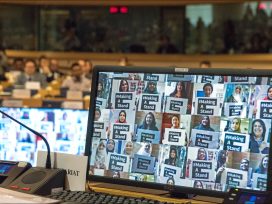Religion and the profane
Ernest Gellner looks for the cause of some surprising developments in the twentieth century: the rising strength of Islam (in particular, Muslim fundamentalism); the upsurge in nationalism; and the unexpected and total collapse of Marxism. Behind both Muslim fundamentalism and nationalism, Gellner sees a break from local communities and hierarchies. And the main fault in Marxism, says Gellner, was the abolition of the profane. The big success stories today, he writes, “are the plural, liberal societies – what I call the unholy alliance of consumerist unbelievers.”
Tonight I will try to explain a few of the major striking events of our century – some very surprising, some a little less surprising. Very surprising is the tremendous success of Islam in maintaining and strengthening itself. Most social scientists accepted the secularization thesis, which argued that in modern or industrial societies the hold of religion over society and over the hearts and minds of men declines. This seems more or less true with one striking exception: the world of Islam, where the hold of religion over society and over men in the past hundred years has certainly not diminished and seems to have increased.
The other equally surprising event of the century is the unexpected and total collapse of Marxism. Marxism is often and correctly compared to religion, sometimes even described as secular religion, as it had many of its features – total vision, the promise of righteousness on earth, etc. It did, however, lack one prominent feature of religion – that is, when religions are established, they retain a hold on the hearts and minds of men, and do not collapse easily. When they do collapse, there is some resistance and struggle; some people remain loyal to them. Marxism succeeded in retaining the loyalty of a remarkably small number (perhaps none at all). In the post-communist world, there is, of course, the frequently noted return of the ex-Communists. But these merely stand for the maintenance of their own position, less radical change, keeping the welfare provisions, and so on – they are basically conservatives. The really interesting thing about them is that none of them have returned under the “banner of Marxism”. In those societies that were under Marxist domination for forty to seventy years, the Bolsheviks utterly failed to emulate the Jesuits and other representatives of the Counter-Reformation in leaving deep marks in the souls and the societies of their adherents. This is also an interesting and important fact that is worth trying to understand.
Then there are some facts that are just slightly less surprising, though they were not properly anticipated: the strength of nationalism in this century (which is no longer surprising). But of course, for a long time the decline of nationalism was confidently predicted. The syllogism that entails the demise of nationalism has two features. First of all, it is shared by Marxists and liberals, and secondly, it is absolutely cogent. The premises are correct, the conclusion follows from the premises; the only thing that is wrong with the conclusion is that it does not correspond to the real world. The argument is very simple: nationalism depends on ethnic, cultural, and national differences, which it turns into principles of political membership and loyalty. This is unquestionably true. Secondly, the conditions of the industrial world, with the tendency towards mobility, dissolution of local communities, instability, standardization of communication, and so on erode cultural, linguistic, and ethnic differences. Thus one can conclude that nationalism ultimately collapses in the modern world because the foundations upon which it is built are gradually eroded.
Unfortunately, as I said, the conclusion does not correspond to the facts. Thus there must be some additional factors that are working; I shall try to point them out. The proposition that nationalism would ultimately collapse was, on the whole, shared by Marxists and Liberals. These two camps disagreed only about the precise causes of its collapse. For the Liberals, it was the international division of labour and the advantages thereof, and for the Marxists, it was the terrible melting pot of the pauperized international proletariat, which through its pauperization and alienation would be separated from its erstwhile ethnic roots and would have loyalty only to that terrible melting pot. In their cultural nakedness, there would be something like a pure essence of humanity that would reassert itself in the proletariat.
The fourth feature of our century is the relative success of semi-secular, pluralist, liberal “democracies” which have won the wars in which they were involved. They won the military war that ended in 1945 (which was a close call) as well as the economic war that ended in 1989. This was one of the most conclusive conflicts in the history of mankind. Perhaps the fifth feature, the right-wing alternative vision of how to run an industrial society (which was eliminated in 1945) also deserves some comment.
Islam
Let us now examine Islam. Why is lslam so astonishingly successful? Why is it resistant to secularization? I shall begin by offering a model of what traditional Islam was like (without going into the early History of Islam). To put it simply, Islam, at least that of the arid zone between the Hindu Kush and the Atlantic and the Niger bend, was divided between a high culture and a low culture – a high Islam and a low Islam – and these two coexisted in an unstable way. Most of the time they were peaceful, but nevertheless had conflicts at fairly regular intervals. The chief difference between the two is that high Islam does not permit mediators (it has a special name for the sin of mediation: shirk), while the world of low Islam is full of them. High Islam encourages a direct relationship between a unique deity and the individual believer; it is not attached to ritual, contains little magic and supernatural belief, and is heavily moralistic, scripturalist, puritan, monotheistic, and individualistic. It is the Islam of the scholars – the high Islam recognized as valid by the believers but not practiced by them. It is not practiced because it does not correspond to the needs of the lower classes and above all the rural Muslims, who for obvious reasons require a much more Durkheimian religion – in other words, a religion in which the sacred has its mediators, its incarnation, and which mirrors the social structure. Most of the rural Muslims were encadrés, incorporated in rural autonomous or semi-autonomous congregations, village lineages, tribes, clans, and the like. For their internal organization and life, they had a Durkheimian religion where the sacred is incarnated in periodic rituals, in sacred objects, sacred practices, sacred persons. One can say that an upper-class, urban, individualistic, puritan, “protestant” Islam (which is strangely united by the theologians and jurists who are its main carriers, despite the lack of a central organization and any kind of central secretariats and hierarchy) coexisted with a fragmented, “Catholic” Islam which had the “Catholic” characteristics of hierarchy, ritualization, employment of the sensuous forms of religion, of mystical exercises, and so on. One can see how this fits well with Durkheim’s theories of religion having the function of underwriting, rendering visible, and legitimating the communal organization in which Muslims lived. During periodic attempts at self-reformation, these two forms came into conflict, but most of the time they coexisted harmoniously. On this issue I agree with the theory best formulated by David Hume about the oscillation in the religious life of mankind between Protestant-type and Catholic-type religions. In periodic outbursts of zeal and self-reformation, the puritans would temporarily prevail, but the exigence and the demands of social life would again lead to a swing-back to a personalized, hierarchical, ritualized, non-scriptural religion with an ethic of loyalty rather than an ethic of rules. Thus Islam existed in a permanent oscillation between unsuccessful reformations and reversions to the old cultural habits. And, of course, there is a specific difference between Islam and western European Christianity in this matter: in western Europe, the hierarchical, ritualized loyalty-ethics is at the centre and carried by an institution rather than by abstract doctrine, while the individualist, scripturalist, puritan version is fragmented and relatively marginal. In Islam, it is the other way around; the central tradition is individualist and scriptural, and the fragmented deviationists are hierarchical, ritualistic, and so on – a kind of mirror image.
As far as I can see, there is nothing to stop Islam oscillating between these two forms. The oscillation was noted by the superb Muslim sociologist lbn Khaldun around 1400, and echoed by Friedrich Engels in a passage where he obviously uses lbn Khaldun without actually quoting him. He says – contradicting the main thesis of Marxism – that all classes and class-societies are inherently unstable and due for internal destruction through their internal contradictions. In this passage, the dreadful ethnocentrism of the two founding fathers of Marxism comes out as he specifies that the instability of classes and class-societies applies to “us” Europeans, whereas “those” Orientals, especially Arabs and Muslims, are locked in a kind of cyclical world which never manages to break out. And, admittedly, our social conflicts are distorted through the prism of religious language, but at least when the religious conflict is over something new emerges and we reach a higher level. All the Orientals do is go around in a circle.
My theory of why Muslim fundamentalism has the astonishing strength that it does is the following: modern conditions unhinged the pendulum of this unstable oscillation and permanently and definitively shifted the centre of gravity away from the pluralistic, hierarchical, organizational, Durkheimian style to that of high Islam. Of course, the reason why this happened is that the process of modernization, the political and economic centralization employed by the colonial and post-colonial states, destroyed those communities that had provided the basis for the Durkheimian or low- culture style of Islam. By turning clansmen, lineage members, villagers, and tribesmen into labor migrants and shantytown dwellers, it atomized the population and prompted them to find their identity in a high religion, in a high culture, that provides an identity shared by all Muslims, uniting them against the outsiders. Previously there did not exist a national identity in Muslim countries. Most people were first and foremost members of a local community under a local authority. Modern Muslim nations, especially in ex-colonial countries, are simply the summation of Muslims in a given territory. But this does mean that lslam provided the identification against the other.
It provided a ratification of their transition from a rural to an urban world, and it provided an idiom for expressing their change of status from that of rustic ignoramuses to people aspiring to urban sophistication. It also provided them – as is presently visible in the bitter and tragic conflict in Algeria – with a means of criticizing their current rulers. It provided an idiom for those non-Westernized people who take their Islam seriously, as against the technocrat Mamlukes who govern them in virtue of their access to Western technology. I think it is in these terms – the reaction of recently urbanized, disoriented Muslims who are separated from their previous saint cults and local structures but who need to define themselves against an exploitative, semi-Westernized upper class – that the wave of Muslim fundamentalism should be understood.
Nationalism
In my opinion, the emergence of nationalism in Europe should not be understood in its own terms. The self-image of nationalism and the reality of nationalism are inversely related. Nationalism is a phenomenon of Gesellschaft that speaks the idiom of Gemeinschaft. It is the byproduct of a new situation, not dissimilar from what I said about Islam. The main role of culture in an agrarian society is to underwrite, express and internalize people’s status in a stable world structure – in other words, that of an extremely hierarchical society. People’s identity is closely linked to their position in society. Culture reinforces this and provides an external expression, making it visible and therefore less frictional. It also helps the members of society to internalize it and to accept it as an absolute part of the human condition. A stable, hierarchical society has been replaced by the agents of industrialism and the accompanying science and technology, by a mobile, anonymous society without an accepted hierarchy, and above all, in which work has ceased to be physical and has become semantic (ie work is communication) and therefore culturally homogeneous. In advanced societies, there is no longer a division between a high culture and a low culture, rather, the high culture is the culture of the entire society.
I do not mean “high culture” in an evaluative sense, but as indicating a culture linked to writing and transmitted by formal education – and not at the mother’s knee. It has to be standardized over large areas so that people can communicate in a context-free manner because their work situation consists of communicating with people whom they do not know and whom generally they do not even see. So the message has to carry its own meaning independent of context. For the first time in history, formal education permeates the entire society rather than being the privilege of a small specialized stratum of scholastics, talmudists, bureaucrats, or jurists. This is a unique situation. But the consequence is that social participation and effective economic, political, and cultural citizenship is a condition of the mastery of a given high culture. The perpetuation of that high culture is a very expensive business which has to be undertaken either by the state or at least protected by the state. All this leads to the link between state and culture, which is the essence of nationalism. This imposes nationalism on modern man. (I vehemently repudiate the conventional theory of nationalism, which claims it is an expression of something inherent in the human psyche and society). Nationalism is inherent to the conditions of modern industrial life, but it is not inherent in all societies. Of course, the nationalists accept the fact that nationalism – although, according to them, universal and ever present – was for some bizarre reason asleep in the past and needed to be awakened in order to be politically effective (the most frequent expression in central and eastern Europe is the notion of awakening – Deutschland erwache!). In reality it could not be awakened because it did not exist. It was engendered by modern conditions.
Why did the same process of a shift from incorporation in local communities with their hierarchical expressions of the sacred, into a mobile, anonymous and semantically standardized society express itself as nationalism in Europe, and as fundamentalism in the world of lslam? I have no clear answer to this. The early history of nationalism in Europe does, of course, have its links with Protestantism. It looks as if the two were aligned. Bernard Shaw expressed the argument very well in his Preface to St. Joan, where he says that the English burned St. Joan as a nationalist, while the church condemned her as a Protestant, and that she was both. This link between Protestant or proto-Protestant movements and national consciousness and the stress on the vernacular was particularly visible in the Hussite movement in Bohemia in the fifteenth century. But as nationalism progressed, it divorced itself from religion or only used it in a somewhat opportunistic spirit. Poles used Catholicism because their enemies and neighbours on either side were non-Catholic, therefore being Catholic was an excellent definition of being Polish, and of course provided an admirable rival counter-state and counter-organization during the days of Communist rule. In the long run, nationalism and religious doctrine have parted.
Not so in Islam. For a time it was not clear whether fundamentalism or Arab nationalism was dominant and which was being used in the service of the other. But by now it is fairly clear that fundamentalism is much stronger than nationalism. It is not clear to me why the link between a universalized individualist high culture and the doctrine which inspired it should have been preserved in Islam and severed in Europe. It is, maybe, a historical accident. My diagnosis of the two movements is similar, but I have no good explanation as to why they took such radically different forms in their respective societies.
Marxism
The strength of Islam is one surprise of this century, and the astonishing collapse of Communism – virtually the entire body of Sovietologists and Soviet scholars failed to foresee it – is the surprise in the other direction. What explanation is there?
Of course I do not know the answer. There are ex-Communists, but nobody sticks to the ideology. People cling to continuity and to their privileges, but nobody is clinging to the doctrine. Why is that so? I have a theory on this and I am happy to try it out on you. What undid Marxism is not its secularism, but on the contrary, its pantheism that it inherited from Spinoza through Hegel. The basic Messianic ideal of Marxism – which had a particular appeal for the Russian soul – was to abolish the separation of the sacred from the profane in human life. The idea that the world was bound to be soiled and miserable, while fulfillment was to be found in another realm, was merely a reflection of a divided society. The future lay in a unitary world of total consummation. Of course, Spinoza’s image, historicized by Hegel, was taken over by Marx. One conventional theory is that man cannot do without religion. The theory I bring forward is that he cannot do without the profane. The failure of Marxism to keep a hold on the hearts and minds of the people who were subjected systematically to its exclusive monopolistic propaganda was due to its abolition of the profane. The striking fact seems to be that the Marxist faith was not destroyed by the mass and random murdering of the Stalinist period, but rather by the relatively mild and on the whole acceptable period of stagnation. You only have to read Andrej Sakharov’s memoirs, one of the best accounts of the Soviet world. Sakharov was a supremely intelligent man who felt deep contempt for most of the individual theses of Marxism. Nevertheless, as he says in his memoirs, he accepted the overall vision. Here there was a radical transformation of the human condition, and if it exacted the price it exacted – mass murder, suppression of liberty, use of slave labour (he knew all about it, because when he was working on the bomb he used slave labour himself) – this was regrettable but necessary. One cannot expect a radical transformation of the human condition to be unaccompanied by a bit of blood. The squalor and sleazyness of the Breshnev period of stagnation, when the comrades stopped murdering and merely started bribing each other, led to a total erosion of faith, so that when Gorbachev took off the lid, they suddenly realized that their ideology was truly a case of the Emperor’s New Clothes.
As far as I can see, the difference between the success of Islam and the failure of Marxism is that Marxism was precisely unitarian, pantheist, and wanted a total consummation in this world. It sacralized the real world and spurned the old habit of finding consolation in the sky. This goes to the heart of Marx’s personality; he was the ultimate bourgeois. His vision of the world was a generalization of the bourgeois vision that the essence of man is work – not aggressiveness, not virility, not status. Fulfillment is through work and work is its own reward. The bourgeois are people who work not only because they are paid for it. This stands in opposition to an aristocrat or a working man – the aristocrat does not work at all and the working man works in order to get his salary. The bourgeoisie has always hoped that there would be a world in which the rule of thugs and humbugs, of the red and the black, would be replaced by the rule of the people who really work.
So Marx merely stated that for which the bourgeoisie has always hoped. The real secret of history is the transformation of work relationships. The relationship of men to their tools and to production is what determines events. Violence is merely a servant for radical change. It tells the thugs: you may wave your swords about, but you have not produced the changes, you are of no importance. Marxism is a bourgeois fantasy that work is the essence of man, work relations determine history, work is a fulfillment.
Islam has its merits. It is acceptable to the modern world because of its unitarian, puritanical denial of magic. At the same time it regulates life. However, it never claimed that work is sacred. During periods of diminished zeal and enthusiasm, the Muslim can indulge in business without thinking it sacred. And if business life is not everything, so what? Nobody ever said it was meant to be.
What are the lessons of the century to be drawn by looking at Islam, nationalism, and Marxism? Presently the success stories are the plural, liberal societies – what I call the unholy alliance of consumerist unbelievers. That may sound pejorative, but in fact I approve of those societies that order themselves in the name of consumption, the expectation of general prosperity, and the privatization of salvation and virtue. The essence of Marxism was that it provided a secular counter-answer to the earlier theological absolutism, to total salvation – that is, a social order which is meant to be an implementation of an absolute morality. The plural societies refrain from this; they live in a kind of ambiguous shadow world with a compromise between inherited beliefs which are not taken seriously, and pragmatic consumerist considerations which have their authority but of course do not have any kind of absolute aura to them. Whether that kind of society can continue, whether it can survive the saturation of consumerism, I cannot say. One should not underestimate the value of technological innovation, but in my view there is a point of diminishing returns. Large parts of the world are still very hungry for material improvement, and the differences between the haves and the have-nots are still powerful. I do not think this can go on indefinitely.
This article is based on the transcription of a lecture Gellner gave in October 1995 in Heidelberg at a conference organized by the Deutsch-Amerikanisches Institut on “Religion als Kultur und Antikultur” (Religion as Culture and Anti-Culture). This was most probably Gellner’s last lecture as he died in early November 1995 in Prague. The eminent anthropologist and philosopher had been an active participant in many events of the Institut für die Wissenschaften vom Menschen, Vienna. In the framework of the TERC-Program, he served as the first European Chair in Social Sciences and Humanities at Warsaw University, and he was a contributor to Transit.
The lecture was originally transcribed by Caroline Schmidt Hornstein and published in the Internationale Zeitschrift für Philosophie , Ed. Günter Figal and Enno Rudolph, 1/1996 .
Published 28 August 2000
Original in English
First published by Internationale Zeitschrift für Philosophie 1/1996
© Transit / Internationale Zeitschrift für Philosophie / Eurozine
PDF/PRINTPublished in
In collaboration with
Newsletter
Subscribe to know what’s worth thinking about.
Related Articles

Kulturkampf
Vagant 2–3/2020
‘Vagant’ explores intellectual landscapes of the New Right: including Thilo Sarrazin, Monika Maron and Michel Onfray. Also, a conversation with Danish novelist Olga Ravn Ravn about dominant attitudes to motherhood.

In 2020, the Republican Party continued to gain ground among voters identifying as religious – almost three quarters of the US electorate. The most dramatic shift was among Muslims. Why was this the case, given Trump’s irreligiousness and record of hostility towards Islam? And what does the trend have to do with race?





